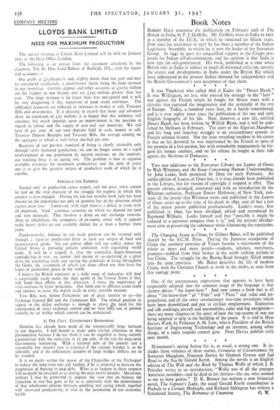Book Notes
ROBERT HALE announce the publication on February loth of The British in India, by P. J. Griffiths. Mr. Griffiths went to India in 1922 as a member of the I.C.S., in which he remained for fifteen years. Ever since his retirement in 5937 he has been a member of the Indian Legislative Assembly, in which he is now the leader of the European Group. In 1942 he gave his unqualified support to the Cripps pro- posals for Indian self-determination, and his opinion is that India is now ripe for self-government. His bock, published at a time when British rule in India is subject to much ill-informed criticism, surveys the events and developments in India under the British Raj which have culminated in.the present Indian demand for independence an9l the British Government's tacit acceptance of that claim.
It was Thackeray who called Abd el Kader the " Desert Hawk." It was Wellington, no less, who praised his strategy in the " holy " war against the French which he fought for fifteen years with a chivalry that captured the imagination and the sympathy of the rest of Europe. Today, a hundred years later, he is barely remembered, and it is over eighty years since the publication of the one and only English biography of his life. Now, however, a new life, entitled Desert Hawk, has been written by Wilfrid Blunt, and it will be pub- lished by Methuen in February. The story of the Algerian Marabout and his long and hopeless struggle is an extraordinary episode in French colonial history. Not the least revealing incident in his career is that on his downfall he was imprisoned by the French in spite of the promise of a free pardon, but with remarkable magnanimity he for- gave his former enemies, and on his release he fought at their side against the Moslems of Damascus. * * *
Two new additions to the Everyman Library are Leaves of Grass, by Walt Whitman, and An Essay Concerning Human Understanding, by John Locke, both promised by Dent for early February. An earlier edition oiLeaves of Grass has, it is true, already been published in the Library, but for reasons of copyright it stopped at 1871. The present edition, arranged, annotated and with an introduction by the Whitman authority, Professor Emory Holloway, of New York, con- tains all the poems that Whitman wrote and published in the Leaves of Grass series up to the time of his death in 1892, and all but a few of the minor poems published posthumously. Locke's essay, first published in 169o, has been abridged, edited and introduced by Raymond Wilburn. Locke himself said that " possibly it might be reduced to a narrower compass than it is," and the present abridge- ment aims at preserving the substance while eliminating the repetitions.
• *. * The Changing Scene in China, by Gilbert Baker, will be published shortly by the S.C.M. Press. During the Japanese occupation of • China the southern province of Yunan became a microcosm of the whole as more and more people—students, scholars, merchants, peasants—trekked from their homes in the north seeking asylum in free China. The struggle for the Burma Road brought Allied troops into the same province. Mr. Baker describes the life of modern China, with the Christian Church at work in the midst, as seen from this vantage point. * * * *
One of the portmanteau expressions that appears to have been respectably adopted into the common usage of the language is that clumsy phrase " the know-how." And now comes a book that is all about " the know-how " of " Fido" and " Pluto " and radar and jet- propulsion, and all the other revolutionary war-time inventions which have been demobilised and put to civilian employment. Explosives and silk stockings, aircraft and automobiles, radar and fog navigation- there-are many chapters in the story of how the top-secrets of war are being adapted to help in the building of the peace. It is told in How Secrets Work, by Professor A. M. Low, who is President of the British Institute of Engineering Technology and an inventor, among other things, of a radio torpedo control gear. Peter Davies publish early next month.
* * * * Heinemann's spring fiction list is, as usual, a strong one. It in- cludes three volumes of short stories, Creatures of Circumstance by Somerset Maugham, Nineteen Stories by Graham Greene and Sad Road to the Seq by Gerald Kersh. Among the novels is an English edition of The Web and the Rock by Thomas Wolfe of which J. B. Priestley writes in an introduction, " Wolfe was of all the younger American novelilds—and he died in his thirties—the one who seemed to me to have genius." D. K. Broster has written a new historical novel, The Captain's Lady, the usual Gerald Kersh contribution is Prelude to a Certain Midnight, and Richard Aldington has written a fictionised history, The Romance of Casanova. G. W.


































 Previous page
Previous page